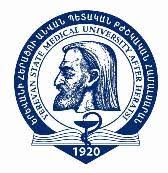College
Yerevan State Medical University

Yerevan State Medical University was established in 1920 as a faculty and became an independent institution in 1930. It is a leading government university in Eastern Europe and is listed in the Directory of Higher Medical Institutions recognized by the World Health Organization (WHO). The university is also recognized by other international professional groups such as WHO and MCI. With a well-managed comprehensive structure and a highly qualified teaching staff, Yerevan State Medical University is known for its advanced system of education and updated technology in medical studies. The university employs high-tech methods of practical medicine to train students to be focused, competitive, and flexible in the global market. The university provides excellent infrastructure for students, including spacious hostels, modern classrooms, and libraries. Additionally, the university offers a healthy and friendly environment on campus, with activity centers such as a gym and separate sports complex. Yerevan State Medical University believes in the overall development of its students and organizes various personality development programs, seminars, debates, conferences, and student exchange programs. The university also encourages students to participate in cultural and sports events.
Yerevan State Medical University is offering an affordable medicine program to train doctors for neighboring and distant countries. As a member of the International Association of Universities, the university has exceptional opportunities for international relations, student exchange programs, overseas internships, participation in grant programs under the auspices of UNESCO, joint research work, and conferences. YSMU has established partnerships with about 30 universities worldwide. In its nearly 100 years of existence, the university has produced over 30,000 doctors. The faculty of 1,100 professors includes more than 162 Doctor of Sciences and 481 Ph.D. degree holders. Currently, over 7,000 aspiring doctors are enrolled at the university, with 24% of them coming from 26 different countries, including the United States, Russia, Germany, India, Israel, Canada, Iran, Iraq, Georgia, Great Britain, Greece, Kazakhstan, Turkmenistan, Venezuela, Syria, Singapore, Australia, Poland, Sweden, China, France, Jordan, Cyprus, Lebanon, and Sri Lanka.
